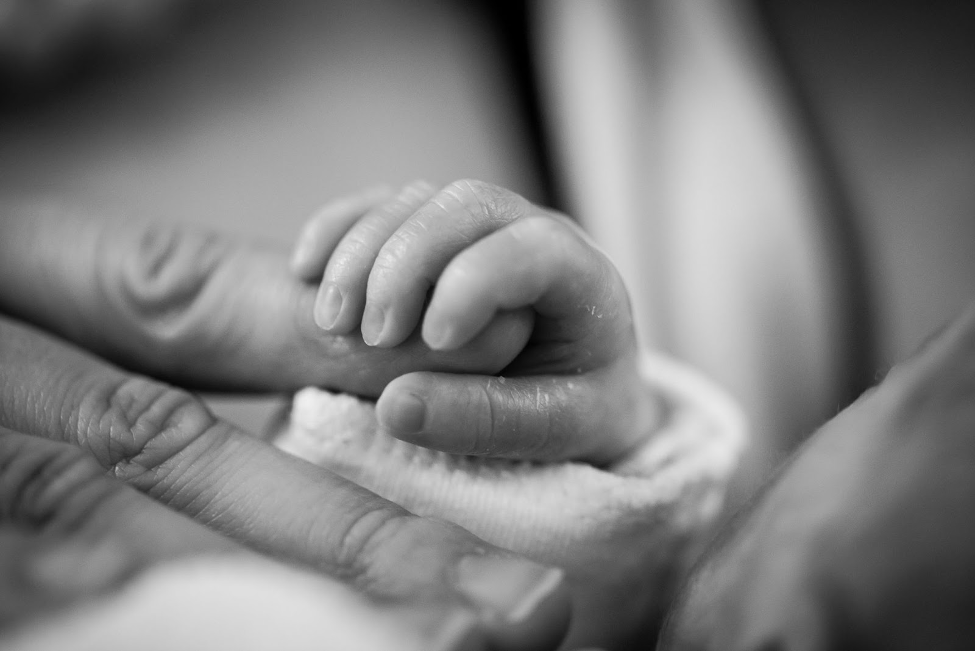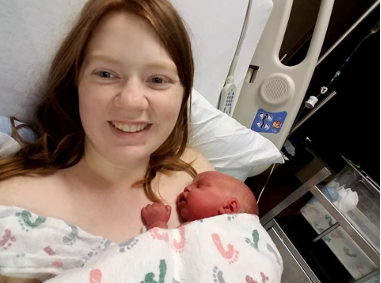100 Think Piece: “Are Women Overprepared For Pregnancy and Underprepared for Postpartum Recovery?”
Aurora Coyle
Instructor Alicia Beretta
English 1023.01
15 December 2021
Are Women Overprepared For Pregnancy and Underprepared for Postpartum Recovery?

Image 1. Infant gripping a mother’s finger after birth (courtesy of Pixabay.com).
If you were to ask me, “What was the happiest day of your life?” without a doubt I would name February 15th, 2019—the birth of my son. To this day, I still remember the feeling of time standing still as he lay on my chest, trying so hard to hold his head up as he listened to his dad and I sing to him. I remember his grayish eyes holding such confusion, yet such recognition at the sounds of our voices. I was breathless and astonished at the tiny wonder I held so close to me, but I felt ready. After all, I had spent months following pregnancy apps, developing a birth plan (and a back-up birth plan), Googling parenting techniques, infant schedules, developmental milestones, and breastfeeding.
Everyone and their grandmother wanted to offer me advice and knowledge on pregnancy or offer a variety of birth plans to consider. Not to mention the internet was filled with limitless sources of information on what to expect during pregnancy up through delivery day. Yet, somehow my obstetrician, the internet, and even my own mother had forgotten to mention what my recovery process would be like once my little man was in my arms. So after I had my son it became clear to me that everyone wants to talk about pregnancy and labor, but no one wants to discuss the period of postpartum recovery that is painful and scary, and quite honestly it feels embarrassing to talk about our bodies after birth.
Allison Yarrow, an opinion piece writer for Vox, agrees that postpartum recovery is not discussed openly in polite society and even argues that the standard 48-hour, post-birth hospital stay is too short, sending women home with “ample resources about their babies [but] little guidance about how they can care for their own bodies, and how their partners, friends, and families might help them.” Often once the baby is born the focus on who is receiving care shifts. My nurses woke me every 2 hours to make sure my son was eating, breathing, and even pooping correctly. Yet, I was so confused when I was being handed pads, pain spray, and even stool softeners an hour after my son’s birth with little to no explanation.
Occasionally, between breastfeeding sessions and short naps, I was asked, “Are you in pain? Any clotting in your blood? Are your legs feeling okay?” I assumed that because I had just given birth and had several stitches put in, surely some pain and clotting would be normal. I assumed that because I’d received an epidural during labor that my legs would take some time to get reacquainted with feeling sensations again. But once I returned home, and the days turned into a week, I began to wonder, “Am I supposed to still be bleeding? What would a clot look like in this case? Are my feet still supposed to be swollen?” I struggled to reach out to my doctor about my concerns.
Yarrow says this is common in new moms. A recent study found that many women “weren’t aware of treatments that could help them and were too embarrassed to discuss symptoms that medical professionals hadn’t brought up with them first” (Yarrow). During pregnancy and through labor, women often rely on their obstetricians to relay important information, such as updates on fetal development or how to make a birth plan for delivery day. However, in the weeks or months that follow, postpartum health issues are rarely brought up by obstetricians, causing women to hesitate to bring up their recovery concerns.
There is a direct consequence for this lack of discussion on postpartum care in the United States specifically. As present, the United States has the highest rate of maternal deaths in the developed world (Tikkanen et al.). As a result of women being too embarrassed to discuss their symptoms with their doctors, symptoms led to hemorrhaging, infection, sepsis, or even blood clots creating blockages in the arteries to the lungs. These are common postpartum complications, most of which are preventable, but how does that work when we aren’t told what to look for?
Of course, there are those that claim advances are being made on the postpartum education front. Ashley Fetters, a former staff writer for The Atlantic, is quick to point out comedian Ally Wong’s humorous take on postpartum recovery, saying, “Wong devoted 27 consecutive minutes of her Netflix special Hard Knock Wife to the surprising amount of gore and physical agony that awaited her after she gave birth to her first child. ‘Nobody told me,’ she practically shouts, about how much ‘crazy shit’ would come out of her in the days after the birth.” Examples such as this one, however, aim less at informing women about the recovery process from labor and more toward entertaining an audience. Wong’s stand-up routine also placed heavy emphasis on the “horrors” of postpartum recovery, when the whole process would be immensely less horrifying if women were simply more informed on what to expect from their bodies after birth.
While many people blame postpartum depression, anxiety, or other mental health challenges on the long nights spent awake tending to a newborn, maybe it is time to blame the lack of postpartum recovery education we provide to new moms. Maternal health journalist Wendy Wisner claims, “This lack of communication about the toll of pregnancy on the body and the process of postpartum recovery leaves a lot of moms surprised by how intensive and lengthy the healing process can be. Plus, many new moms are confused about and unprepared for what happens during each phase of recuperation, which can last months.” It’s reasonable to assume that some of the stress from being a new mother stems from this confusion, from the fear of not knowing what is changing within our own bodies and whether or not these changes are normal.
So how do we prepare ourselves for postpartum recovery? What should you expect in the weeks and months that follow the delivery of your amazing little miracle? I turned to my friends, both moms and childless friends alike, to understand common concerns related to postpartum recovery. Then, I used my own postpartum experience as well as articles from medical professionals to tap into what limited advice and knowledge is available.
KNOW THAT RECOVERY TIMELINES VARY. While most women return back to work within 6 to 12 weeks postpartum, it can take many more months to fully recover. In fact, hormone levels on average return to normal 6 months postpartum and your hips will take about 2 years to reposition themselves to where they should be.
KNOW THAT DELIVERY TYPE IMPACTS RECOVERY. Every birth is different. Some women have an unmedicated birth, some use an epidural, and some will request or require a C-section. For this reason, recovery will vary depending on the type of birth procedures or processes used. Don’t assume that someone who had a C-section is going to have the same recovery as someone who went “all natural” because 12 weeks is the minimum recovery period for a cesarean birth.
KNOW WHAT TO ASK YOUR OBSTETRICIAN. They are the most reliable source of accurate information, and you will create your birth plan with them, so why not make a recovery plan with them as well? At appointments, ask what your recovery will look like and what to expect after labor, especially in the first 48 hours following birth. This time frame is often the best time to catch any early signs of possible complications that may arise postpartum. Ask for clear ideas on what is normal and what is not.
KNOW WHAT YOU NEED. Preparedness is half the battle in postpartum recovery. Because new moms are often so caught up in adjusting to caring for an infant, they frequently forget their own needs or have limited access to recovery supplies. Buy your supplies ahead of time or stock up at the hospital. Some common supplies women need for postpartum recovery include:
-
- Sitz bath salts
- Stool softeners
- Adult diapers
- Pain sprays
- Ice packs
- Lanolin cream, if planning to nurse
KNOW THAT SUPPORT IS KEY. Tell everyone that managing the postpartum recovery process is not only important to new moms, but to spouses, partners, family, and friends who want to support new parents as they transition into parenthood. The more informed your support system is, the better they can help you and other women during what is one of the most challenging seasons of life.
Looking back, I was lucky. I had a healthy baby in my arms, and my recovery went as smoothly as it could possibly go. Yet, there is still this lingering thought in the back of my mind when I think back to those early months of recovery. I often imagine what would have happened if I did have a complication or two along the way. How would I have handled it? Would I have thought anything of the early signs of an infection or a hemorrhage? Heaven knows I knew every fact about what to expect during the first six weeks of my infant son’s life. So, why didn’t I know the facts about how mine would change, too?
 Aurora Coyle is currently a first-year pre-nursing student at Texas Woman’s University, and her career goal is to specialize as a labor and delivery nurse. She has a two-year-old son, whose birth inspired her to apply to nursing school and aim to care for new parents and their babies through one of the greatest experiences of their lives. Aurora is particularly passionate about postpartum recovery because going through the process with almost no expectations or information was frightening for her. Aurora hopes to educate future parents on what to expect during the postpartum recovery period while also giving new moms a realistic idea of what life with a newborn entails.
Aurora Coyle is currently a first-year pre-nursing student at Texas Woman’s University, and her career goal is to specialize as a labor and delivery nurse. She has a two-year-old son, whose birth inspired her to apply to nursing school and aim to care for new parents and their babies through one of the greatest experiences of their lives. Aurora is particularly passionate about postpartum recovery because going through the process with almost no expectations or information was frightening for her. Aurora hopes to educate future parents on what to expect during the postpartum recovery period while also giving new moms a realistic idea of what life with a newborn entails.
Works Cited
Fetters, Ashley. “The Demystification of the Postpartum Female Body.” The Atlantic. 2 August 2019, https://www.theatlantic.com/family/archive/2019/08/postpartum-pregnancy-motherhood/595243/.
Pixabay. Grayscale Photography of Baby Holding Finger. 2012.
Tikkanen, Roosa, et al. “Maternal Mortality and Maternity Care in the United States Compared to 10 Other Developed Countries.” Common Wealth Fund, 18 November 2020, https://www.commonwealthfund.org/publications/issue-briefs/2020/nov/maternal-mortality-maternity-care-us-compared-10-countries.
Wisner, Wendy. “Your Postpartum Recovery Timeline: What to Expect Week by Week.” Verywell Family, 17 April 2020, https://www.verywellfamily.com/postpartum-recovery-4771494.
Yarrow, Allison. “What No One Tells New Moms About What Childbirth Can Do To Their Bodies.” Vox, 4 May 2018, https://www.vox.com/science-and-health/2017/6/26/15872734/postnatal-care-america.
